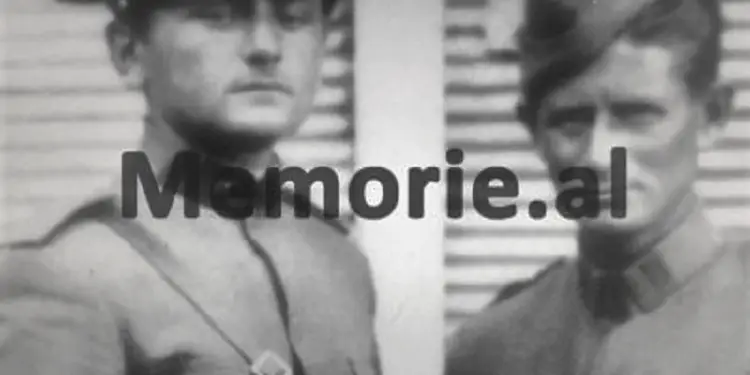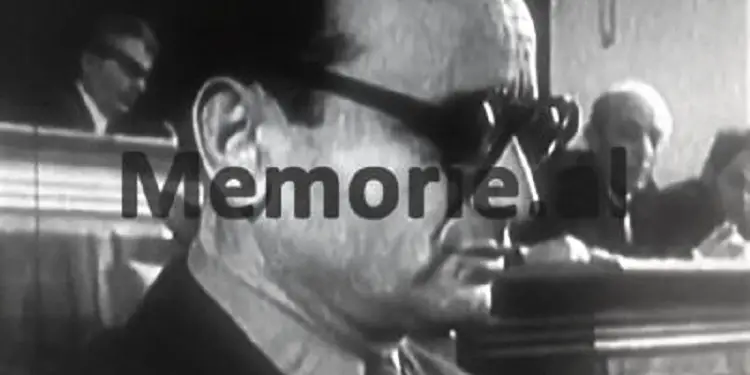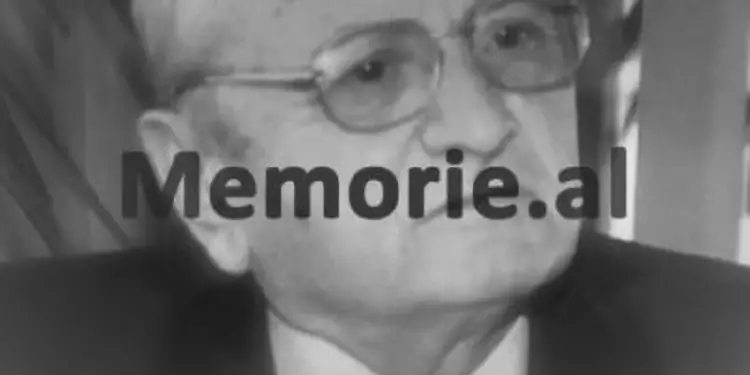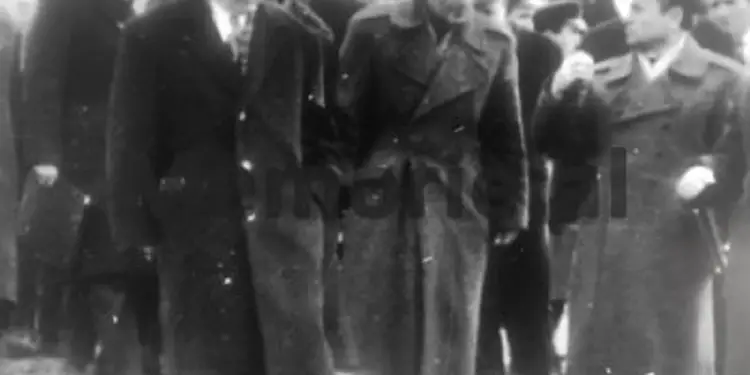Dashnor Kaloçi
Memorie.al publishes some of the unknown stories that took place between the main leaders of the senior communist leadership in the Political Bureau of the Central Committee of the ALP and the Albanian government, starting with Enver Hoxha, Hysni Kapo, Mehmet Shehu, Beqir Balluku, Petrit Dume, Kadri Hazbiu, etc., the reports and relations they had with each other, as well as why the so-called “coup group in the Army” led by Beqir Balluku began in 1974, and why Prime Minister Mehmet Shehu withdrew from his position. his first, where he had demanded that only a light administrative measure be taken against Minister Balluku and his deputies ?! The rare testimonies of the former Deputy Minister of People’s Defense, MP and member of the Presidium of the People’s Assembly, Maliq Sadushi, regarding the reports of conflicts between Enver Hoxha and his closest associates, Beqir Balluku, Mehmet Shehu, Kadri Hazbiu, etc., from 1974 to 1983, what did he accuse them of and how did he use them all against each other ?! What was the organization “Oshëtima e Vjosës” and the letter it sent to the Ministry of Defense in 1982, calling on the senior military to stand up and defend the figure of Mehmet Shehu ?! How were the five deputy ministers of People’s Defense fired after the event of Mehmet Shehu and why were they asked to leave the ministry within 30 minutes ?!
“On the morning of December 18, 1981, the Minister of Defense, Kadri Hazbiu, came to the ministry and called us to his office, to the four deputy ministers: Maliq Sadushi, Nazar Berberi, Mendu Backa, Alfred Mojsiu, and Veli Llakaj. who was also Chief of the General Staff of the Army. Kadriu, who was very shocked that day as never before, told us: Comrade Mehmet Shehu killed himself. After these words, one of us said: Bo, bo, did it like Ndue Marashi! After that, Kadriu told us how he, together with Ramiz Alia, had gone and seen Mehmet Shehu dead in the bedroom of his house. In that tremendous tension that we experienced after learning the sad news of the suicide of our former boss who had been a minister for seven years, and who had chosen us to work as his deputies, I instinctively I asked Kadri Hazbi: Did he leave any letters? This is how he remembered the conversation with his boss, the Minister of Defense Kadri Hazbiu, on the morning of December 18, 1981, former voice/ministry of the People’s Defense, Maliq Sadushi, making public and illuminating some of the unknown sides of the former chief his, Mehmet Shehu, and the relationship he had with Enver Hoxha and Kadri Hazbiu. Maliq Sadushi, former colonel, MP, member of the Presidium of the People’s Assembly and Deputy Minister of People’s Defense from 1974 to 1982 when he was removed from all his functions, for the sole reason that he was one of the close associates of Prime Minister Mehmet Shehu, who was found dead in his bedroom on the morning of December 18, 1981, with his testimony, uncovers some of the unknown sides of one of the most discussed and rumored events. in the 45-year history of the communist regime of Enver Hoxha, an event which from that time until today, continues to arouse curiosity and interest. But who is Maliq Sadushi, what is his past and how did he manage to rise to the high post of Deputy Minister of Defense and member of the Presidium of the People’s Assembly? What were his relations with Mehmet Shehu and what were Sadushi’s impressions from the first meeting with him in October 1942, when Mehmeti had gone to the village of Vajza in Vlora to meet Kadri Hazbi? Why, when Mehmeti was inspecting the North-Eastern border in the Kukës area, in May 1968, did he address Beqir Balluku, Petrit Dumes, and other former generals who accompanied him, telling them that he would propose Enver Hoxha to dismiss them? What were the accusations leveled at Beqir Balluku and other senior soldiers when they were labeled by Enver as the “coup group”? How did the other soldiers who replaced them react, and why did they agree with all the decisions of the Politburo on their sentences? Was there any dissent in the Army, what was Mehmet’s position on the sentencing of the so-called “coup group” and why did he withdraw from his first decision regarding the sentencing of Balluk? What were Enver’s relations with Mehmet and Mehmet’s relations with Kadri Hazbi, and what did Enver say at the meetings of the High Council of Defense about Mehmet? Why did Enver assign Mehmet all the functions that Hysni Kapo had held and how did he describe Mehmet at the meeting of the Defense Council? What attitude did Hazbi hold when the campaign of criticism against Mehmet began, and what did he say to his subordinates about the problem? What was said about Mehmet Shehu in the letter that Enver kept in his safe, who gave it to him, and did she have concrete facts to accuse Mehmet of being an agent? Why did the American CIA colonel say that “Mehmeti had to be eliminated in order to overthrow Enver Hoxha” ?! What was the organization “Oshëtima e Vjosës” and what was said in the letter that she sent to the Minister of Defense, Kadri Hazbiu, and the Chief of General Staff, Veli Llakaj, in the period when Mehmet was unmasked as an enemy? Why? How were the four deputy defense ministers who worked with Mehmeti fired, what was said in the decision of the Politburo regarding their dismissal, and why were they asked to leave the Ministry within 30 minutes ?!
Regarding these previously unknown events and other facts, we know the following interview of Mr. Maliq Sadushi, the man who for seven years held the position of Deputy Minister of Defense, being the first assistant of Mehmet Shehu.
Continued from the previous issue
Mr. Sadushi, what about Kadri Hazbiu, what was Enver Hoxha’s assessment regarding the duty of the Minister of Interior that he was handing over?
Even for Kadri Hazbiu, Enver gave his assessment where he said: “So far, Comrade Kadri has performed very well the functions he had, but he must keep in mind that in the new task he will take on in the Army, he no longer works. with the methods of the State Security, for the fact that the Army has other tasks and the methods of work change ”. So the change in Enver’s job assessments of Mehmet and Kadriu was obvious. He said of Mehmet: “He worked very well”, and of Kadri Hazbi “very well”. These assessments for us were very different from each other.
How were you and your colleagues commented at the time on the functions that Mehmeti took over, which Hysni Kapo had previously had?
After that meeting, we normally discussed with our colleagues the significant changes that were made. Our opinion and the conclusions we drew about those changes were that Enver Hoxha, after that day, was delegating them to Mehmet Shehu and the Party, because he had trusted the state since 1953 when he became Prime Minister.
What was Mehmet’s relationship with Kadri Hazbi after he came to the Ministry of Defense?
Although Mehmet left the Ministry of Defense, he maintained very good relations with Kadri Hazbi and helped him with everything. They were very close to each other, and Kadriu asked Mehmet, who never spared his help, about any problems he would have with the Army.
But after September 1981, when criticism of Mehmet began over the new marriage he made, what was Kadri Hazbi’s position?
During a conversation I had at that time with Kadri Hazbi, it was also mentioned about this problem that you are asking, that is, about the engagement of Mehmet’s son, with the daughter of the Turdiu family. Kadriu told me that: Mehmeti had made a mistake in making that marriage. When I asked him if he, or Feçorr Shehu, had informed Mehmet about his cousin’s biography, Kadri replied: “Yes, we told him, but what does it matter, he made this mistake.”.
Did you discuss this problem again?
A few days before the 8th Congress of the ALP, when we were talking to some other friends, Kadriu asked us: “More, what do they say about Comrade Mehmet? We told him that there was a lot of talk in the people about that problem, and after that Kadriu continued: “The people have the right to speak because Mehmet made that mistake, but that thing will pass.” We did not encourage the conversation anymore, as we did not want to burden Mehmet anymore, as we loved him very much and we had an extraordinary consideration for him.
Those three months from September to December ’81 when Mehmeti was in critical condition, what attitude did Kadri Hazbiu take towards him?
Kadriu maintained the position held by Enver Hoxha and the senior leadership of the Party. In those three months, Kadriu spoke very badly about Mehmet. But I want to say, and not to excuse Kadri, that the words he said about Mehmet were not from his heart, but he was obliged. For that, I say I’m pretty sure.
How did you learn the news that Mehmet Shehu had killed himself?
On the morning of December 18, 1981, Minister Kadri Hazbiu came to the Ministry and summoned us to his office in four Deputy Ministers: Maliq Sadushi, Nazar Berberi, Mendu Backa, Alfred Mojsiu and the Chief of the General Staff of the Army, Veli. Llakaj. Kadriu, who was as shocked that day as ever, told us: “Comrade Mehmet Shehu killed himself.” After these words, one of us said to him: Bo, bo, he did it like Ndue Marashi! Afterward, Kadriu told us how, together with Ramiz Alia, he had gone and seen Mehmet dead in the bedroom of his house. In that extraordinary tension that we experienced after learning the sad news of the suicide of our former boss, whom we had had as a minister for seven years and who had chosen us to work as his deputies, I so instinctively I asked Kadri Hazbi: Did Mehmeti leave any letters? He replied: “It doesn’t matter if he left a letter or not. In fact, he left a letter on the comedy. ”
Did Kadri tell them other details about Mehmet’s suicide?
Apart from what I told them, Kadriu did not tell us anything else about what had happened to Mehmet, and in the end, before he left, he told us: “We have a message that no one will come to Mehmet’s funeral. Some friends from the Prime Minister’s Office and the Army will take part in it. His brother, Duro Shehu (Aviation Commissioner) will come. ” of the Politburo, which would be held that day in connection with the event which had taken place.
What attitude did you take towards Mehmet Shehu, you, his former deputies, and other high-ranking military officials of the Ministry?
After the murder or suicide of Mehmet, as in all departments, many meetings were held with us where his act was condemned. Even the four deputy ministers who had worked with him for seven years discussed with each other, but to curse him, we never insulted him, because we loved him very much and the respect and thoughts we had for him, we did not we could change them so easily, no matter what the situation. We were not convinced that Mehmet was an enemy, but of course, we could not say that openly. I personally appreciated Mehmet very much, and I did not easily overlook him being an enemy, or against Enver, because Mehmet killed you for Enver. If he had been an agent, he would have acted because he had it in his hand and killed Enver whenever he wanted, but Mehmet did not do that because he was not.
But Enver, in the accusations he made against Mehmeti, said that he had documents proving that Mehmeti was an agent ?!
That document that Enver was talking about was nothing but an anonymous letter and the number or figure that was there that was said to be Mehmet Shehu’s number as an agent, there was nothing really. He was the number one Mehmeti had like all the other prisoners when he was in the internment camp in France and that document, Enver had presented years ago, where he had explained that he had been brought by foreign agencies, aiming to divide the top leadership of the Party. That document that Enver served to unmask Mehmeti as an agent was not a fact and was not at all convincing, because if he had, Enver would have made it public by then. Mehmet could not be an agent of the Americans, and this is confirmed by the high-ranking CIA soldiers who wrote about his figure.
Why, what did the Americans say about Mehmet Shehu?
Years ago, I read the memoirs of a CIA colonel, published long before Mehmet’s death, and in those notes of that officer who had worked with the various diversionist groups that came to Albania, among other things: We Americans had ordered our agents to kill Enver Hoxha, but we could not do that, because the State Security, which guarded it, was quite strong. There was also another reason why we could not overthrow Hoxha, because in order to overthrow him, you first had to kill Mehmet Shehu, who was a real son, and since we could not, we gave up. that tactic and we went the other way “.
What about Kadri Hazbiu, what was his attitude towards Mehmet Shehu?
At that time, like the entire senior leadership of the Party, Kadri Hazbiu condemned the act of Mehmet Shehu and agreed with everything that was said about him, such as “polyagent”, etc.
In September 1982, many words were uttered, saying that Kadri Hazbi had fled by plane to America and that these words were being discussed quite freely among the people. Did you in the Ministry know about what was said then?
It is more than true that these words at that time circulated very densely and not only in the people but also in the Army. We had heard this too, and not only about Kadri Hazbiu, but then it was said that Chief of General Staff Veli Llakaj had also escaped.
Did Kadri Hazbiu himself know and ask him about those words and what was his reaction?
Kadri Hazbiu was aware of the words circulating in his address, which, as far as I can remember, came at a time when Kadriu had a meeting with the people of Mallakastra, to explain to them about the attitude that should be held towards the figure of Mehmet Shehu, but he did not ask us at all about those words circulating about him. In response to those words that were uttered at the time, the Central Committee of the ALP commissioned the Chief of General Staff, Veli Llakaj, to show people that they were not true and that Kadri Hazbiu and he (Veli Llakaj) were at work, an article had to be written in “Zeri i Popullit”. And after that, for the whole night, Veliu wrote an article, which was published in “Zeri i Popullit”.
How do you know that Kadri was aware of the rumors circulating about him when you did not talk about the problem?
We knew that at that time, if I am not mistaken, since July 1982, when Mehmet’s campaign of unmasking as an enemy continued, we received several letters signed by an organization called “Oshëtima e Vjosës”.
What was said in those letters and what was that organization?
I had not read those letters, but as Veli Llakaj told me, we were called there: we, as soldiers, to rise up in an uprising, in defense of Mehmet Shehu. I had no idea about that organization, but from its very name, I thought it must have been the Mallakastriots who sought Mehmet’s protection. And so it is true, because as I heard later in Mallakastër, a group of several people were arrested, who had openly come out in defense of Mehmet Shehu, and severe measures were taken against them, imprisoning them, and it seems to me that one of them was shot.
What happened to those letters and how did the Ministry of Defense react to them?
Those letters were immediately handed over to the Central Committee of the ALP and on our part, as the Minister, there was no other reaction. Then we were told that: those letters were made by various agencies, to confuse us.
After Mehmet’s death, did you think they would leave you in that position?
Since the middle of 1982, when the rumors about Kadri Hazbiu’s escape began to circulate, but also some time ago, I had thought that Enver Hoxha would remove us from office in the four deputy ministers we had previously worked with. Mehmet Shehu. This was understandable, as, at that time in the Ministry of Interior, the analysis for Kadri Hazbiu had started, regarding his work in that Ministry. I hadn’t been wrong, because that thing really happened.
When and with what motivation were you removed from the post of Deputy Minister?
It was 8 o’clock in the morning on October 9, 1982, when I was working in the office, one of the secretaries of the People’s Assembly came to me, who brought me to sign a decree of the President of the Presidium of the People’s Assembly, Haxhi Lleshi. , as at that time, I was still a Member of Parliament and a member of the Presidium of the People’s Assembly.
What was said in that decree of the Presidium of the People’s Assembly?
The decree stated: “Comrade Prokop Murra, is appointed Minister of People’s Defense, instead of Kadri Hazbi, who is dismissed from this duty.” Without saying a word to the one who brought it to me, I signed the decree, which had been signed before me and the other members of the Presidium.
How did you sign that decree without attending the Presidium meeting?
There was no problem in signing the decree without being in the meeting because the law provided for such a thing. So that was in accordance with the rules.
What did you think at that moment when you signed the decree for the dismissal of Kadri Hazbi?
At that moment, I immediately thought it was our turn to be fired, and that’s exactly what happened. On the same day, around 12 noon, Prime Minister Adil Çarçani and the new Minister of Defense, Prokop Murra, came to the ministry and called us to the Minister’s office. There, Adil Çarçani communicated to us the decision of the Political Bureau, which had been signed by Enver Hoxha, where it was said that we were the fifth deputy ministers of People’s Defense and in our country, others were appointed.
Were there any reactions from you fifth that you were being fired?
After that communication, there was no comment on our part in the office and also in the decision of the Politburo, there was no motivation for our dismissal. After that, we were told to go to our offices and hand over the assignment. Those who came to replace us told us that they had orders to communicate to us the order that: within half an hour, we should leave the Ministry.
What did you do after that order?
Immediately I left the ministry, handing over only the office key and nothing else. Of the five deputy ministers, only me and Mendu Backa were relieved of their duties, while the other three were fired, but left in the army, leading to other lower positions.
What about the function of the deputy and member of the Presidium of the People’s Assembly, were they removed?
After my dismissal as Deputy Minister, I was immediately dismissed as an MP and as a member of the Presidium of the People’s Assembly. That thing was paradoxical because I was stripped of my immunity and the mandate of the deputy, without being invited at all to the meeting of the Presidium of the People’s Assembly, where I was a member. As an MP and as a member of the Presidium, I could only be dismissed by the People’s Assembly because he had elected me.
What happened next to you after you were fired?
Two months later, I was summoned to the Ministry of Defense’s party organization, where at several meetings I was held accountable for the “irrationality” I had shown, working with “enemies,” and in fact, I had to be tried in the Politburo. that she had me in nomenclature. This was done only for me, that all the other colleagues, were summoned to the Central Committee, and there they were tried and dismissed. But the biggest paradox was that I was convicted once, dismissed from all functions, and then tried, although my sentence was only administrative.
Who was the Deputy Minister of Defense and MP Maliq Sadushi?
Maliq Sadushi was born on February 2, 1928, in the village of Vajza in Vlora, where his family originated from. At the age of 15, at the beginning of 1942, he joined the anti-fascist groups of Vlora and in December of that year, he took part in the Gjormi War, which was his first battle, as part of the territorial partisan unit. of the village. He then enlisted in the Fifth Assault Brigade and took part in all the fighting that brigade fought, as far as the Sandzak of Yugoslavia. He started his military career in October 1944, where he was appointed an officer and was appointed deputy commissioner of the company, in the Fifth Assault Brigade. From 1944 to 1974, Sadushi held several military positions, according to the ranks of the hierarchy, ascending to the post of Chief of Staff of the Corps, having previously studied and graduated from the officers’ training school in Tirana. , “Frunxe” Academy in the Soviet Union, “Mehmet Shehu” Military Academy (of the General Staff) in Tirana and in the Faculty of Philosophy. In December 1974, he was appointed Deputy Minister of People’s Defense, as well as a member of the High Council of Defense, and during this period he was elected Member of Parliament and a member of the Presidium of the People’s Assembly in two legislatures (1974-1982). .) On October 9, 1982, by the decision of the Politburo, Maliq Sadushi was relieved of all his duties and released. This was done because he was considered one of the close associates of Prime Minister Mehmet Shehu, who was declared an enemy, as for seven years he had worked as his deputy in the Ministry of Defense. After the ’90s, Mr. Maliq Sadushi was a member of the National Committee of Veterans of the National Liberation Anti-Fascist War and he engaged in historical studies, mainly during the Anti-Fascist period, for which he had published a considerable number of study and journalistic articles in various newspapers and magazines. He also prepared several books of historical characters, such as the monograph “Perlat Rexhepi”, “Our good village”, “From the Ionian coast to the Sandzak mountains”, which he dedicated to the partisans of the Fifth Assault Brigade, where he had been it’s effective./Memorie.al














